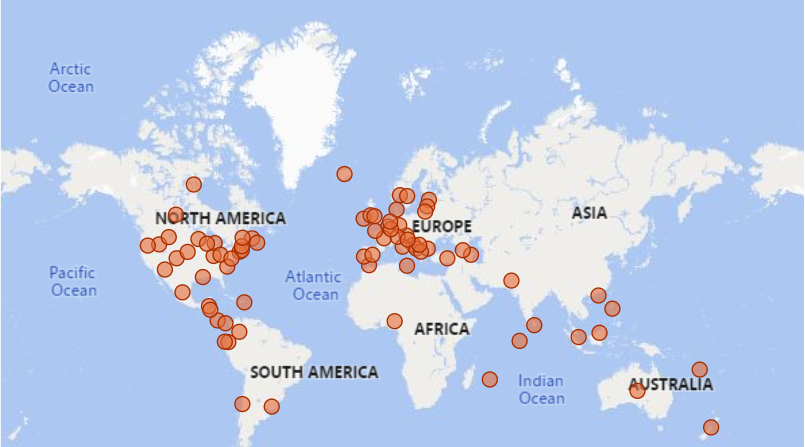The realm of business registries is in a state of constant evolution, driven by technological advancements, regulatory shifts, and global economic dynamics. To gain profound insights into the accomplishments, challenges, and priorities faced by business registries worldwide, the The European Business Registry Association (EBRA) undertook an extensive survey in collaboration with influential organizations including ASORLAC, CRF, and IACA. Termed the IBRR Challenges Survey 2023, this survey aims to unveil emerging trends and pivotal priorities that are shaping the trajectory of business registries globally.
Methodology and Participation
The IBRR Challenges Survey 2023 stands as an inclusive venture, welcoming participation from all business registers. This endeavor garnered a diverse range of responses hailing from jurisdictions spanning continents and varying developmental statuses. Notably, a substantial total of 77 jurisdictions actively participated, contributing their jurisdiction’s accomplishments over the past year, identifying prominent challenges they encountered, and outlining key priorities for the forthcoming year.

Achievements 2022-2023
The survey revealed a panorama of achievements across diverse jurisdictions, categorized into common concepts:
- Digitalization: A recurring theme, 43 jurisdictions showcased commendable strides in digitalization. This encompassed introductions of online services, elimination of paper-based processes, integration of new software and applications, deployment of intelligent automation (IA), adoption of blockchain technology, and establishment of electronic signatures and identification methods.
- New Services: 33 jurisdictions broadened their service spectrum to cater to evolving business needs. These encompassed on-demand access to platforms and systems, electronic process fulfillment, modernized databases and systems, bolstered cybersecurity measures, and the establishment of APIs for seamless interactions.
- New Registers: Notable accomplishments included the establishment of new registers to address specific business requirements in 10 jurisdictions. These included registers of safe deposit boxes, overseas entities, beneficial owners, trusts, and more. The introduction of such specialized registers demonstrates the jurisdictions’ commitment to facilitating diverse business activities.
- Legal Enhancements / Adaptations: Noteworthy accomplishments included legal enhancements and adaptations in 22 jurisdictions aimed at reducing technical issue resolution time, ensuring data accuracy via continuous monitoring, maintaining high service quality, addressing human resource challenges, and curbing risks and fraudulent activities.
- Centralized Services: 4 jurisdictions accentuated centralization initiatives, fostering harmonized processes, interconnecting with national platforms, and introducing centralized registries to streamline services and foster collaboration.
- Beneficial Ownership Regulations: 7 jurisdictions emphasized adherence to regulations pertaining to beneficial ownership, striving to augment transparency and accountability within business operations.
- Sustainability Reporting: 1 jurisdiction showcased commitment to sustainability reporting, indicating an emerging emphasis on corporate social responsibility.
- Personal Data Protection: The survey underscored initiatives aimed at compliance with personal data protection regulations, fortifying sensitive data security and building trust within business circles.
Challenges 2022-2023
Challenges faced by business registries mirrored the diversity of their accomplishments, revolving around common concepts:
- Digitalization: Parallel to accomplishments, digitalization posed challenges for 32 jurisdictions. These encompassed adapting to online services, managing novel software and applications, addressing interconnection issues with other platforms and systems, and ensuring robust cybersecurity measures.
- New Services: While celebrated, new services introduced challenges like ensuring smooth operations, sustaining data accuracy, upholding service quality, and addressing technical and human resource concerns in 9 jurisdictions.
- Legal Enhancements / Adaptations: 13 jurisdictions grappling with legal enhancements encountered challenges tied to reducing technical issue resolution time, maintaining data accuracy, ensuring service quality, tackling human resource issues, and mitigating risks and fraudulent activities.
- Centralized Services: Centralization pursuits brought about challenges in harmonizing processes, interconnecting with national platforms, and ensuring efficient operation of centralized registries in 4 jurisdictions.
- Quality Assurance / Improvement: Certain challenges related to maintaining high service quality and continuous improvement in business registry operations were identified by participating 33 jurisdictions.
- Beneficial Ownership Regulations: Challenges also emerged regarding the implementation and enforcement of regulations pertaining to beneficial ownership, indicating the complexities of transparency and accountability efforts in 4 jurisdictions.
- New Registers: Challenges related to the establishment of new registers were identified by 6 jurisdictions, including the creation of registers of safe deposit boxes, overseas entities, beneficial owners, trusts, and more. These challenges signify the intricate nature of setting up specialized registers to cater to evolving business needs.
Priorities 2023-2024
The survey provided insights into the priorities that business registries intend to prioritize in the upcoming year:
- Digitalization: Reflecting ongoing trends, digitalization retained its position as a top priority in 41 jurisdiction. This encompassed ameliorating online services, introducing fresh software and applications, further delving into intelligent automation (IA) and blockchain, and reinforcing cybersecurity measures.
- New Services: Innovation’s pursuit underscored focus on enhancing services, embracing digital identity provision, modernizing databases and systems, fortifying cybersecurity measures, and streamlining processes through APIs in 17 jurisdictions.
- Legal Enhancements / Adaptations: Priorities within this sphere encompassed reducing technical issue resolution time, sustaining data accuracy, preserving service quality, addressing human resource concerns, and mitigating risks and fraudulent activities in 16 jurisdictions.
- Centralized Services: 4 jurisdictions aimed to reinforce centralization endeavors by focusing on harmonization, interconnection with national platforms, and effective operation of centralized registries.
- New Registers: It was identified as a priority for 3 jurisdictions, including registers of safe deposit boxes, overseas entities, beneficial owners, trusts, and more. This emphasis on new registers demonstrated the recognition of evolving business needs and the necessity for specialized services.
- Beneficial Ownership Regulations: 5 jurisdictions placed priority on the implementation and enforcement of regulations pertaining to beneficial ownership, reflecting the complexities of ensuring transparency and accountability within business operations. This priority aligns with global efforts to enhance financial transparency and combat illicit activities.
Conclusion
The IBRR Challenges Survey 2023 furnishes a comprehensive view of achievements, challenges, and priorities embraced by diverse business registries worldwide. Insights derived from this survey offer a snapshot of the current state of business registries, while also illuminating pathways for future progress. In a landscape characterized by digital transformation and evolving regulations, these surveys play an instrumental role in steering business registries towards efficiency, transparency, and adaptability, thereby fostering a robust foundation for businesses to thrive and economies to flourish.
We invite all business registries to participate and contribute their insights to shape the future of business registry dynamics. Together, we can drive positive change and foster a thriving global business ecosystem.














